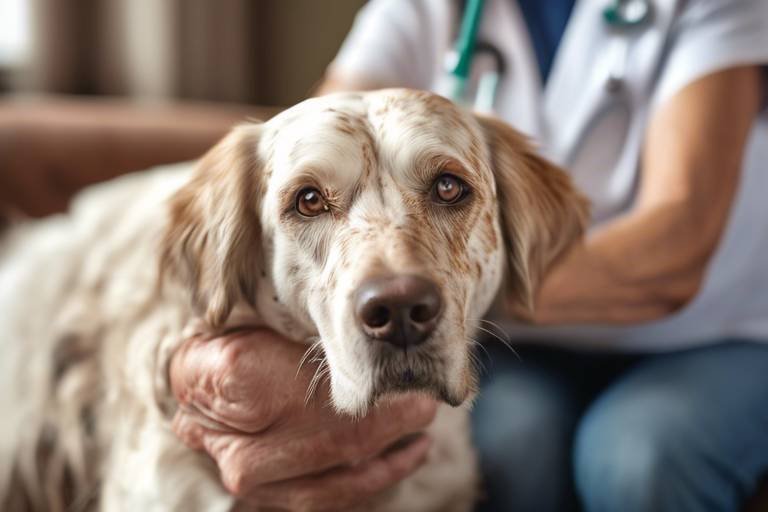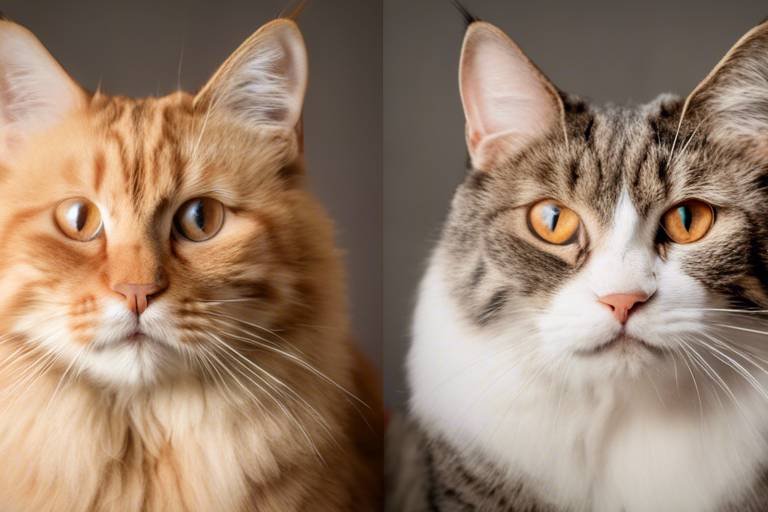The Benefits of Pet Insurance for Senior Pets
As our beloved furry companions age, they become more than just pets; they become family members who deserve the best care possible. However, with age comes a myriad of health challenges that can put a strain on both our pets and our wallets. This is where pet insurance becomes an invaluable asset for senior pets. It offers not only financial security but also peace of mind for pet owners who want to ensure their pets receive the necessary medical attention without breaking the bank. In this article, we will delve into the importance of pet insurance for senior pets, highlighting the various benefits it provides, from managing unexpected health issues to enhancing the overall quality of life for our cherished companions.
As pets age, their health needs change significantly. Just like humans, senior pets can experience a range of health issues that require special attention. Common problems include arthritis, dental disease, kidney issues, and heart conditions. Imagine your pet as an elderly relative; they may need regular check-ups, medications, and sometimes even surgeries. Pet insurance can help manage these challenges effectively by covering a portion of the costs associated with treatments and medications. This means you can focus on providing the love and care your senior pet deserves, rather than worrying about the financial burden of their healthcare.
One of the most significant advantages of pet insurance for senior pets is the financial security it offers. As our furry friends grow older, they often require more medical attention, leading to unexpected expenses that can quickly add up. For instance, a simple vet visit can turn into a costly affair if additional tests or treatments are needed. Pet insurance alleviates this financial stress by covering a substantial portion of these unforeseen costs, allowing you to make decisions based on what is best for your pet rather than what you can afford.
Understanding the difference between routine and emergency care is crucial for pet owners. Routine care includes regular check-ups, vaccinations, and preventive treatments, while emergency care is required when a pet faces a sudden health crisis. Pet insurance typically covers both types of care, ensuring that your senior pet receives comprehensive health management. This means you can take your pet for regular check-ups without the worry of incurring hefty bills, and in case of an emergency, you can rush them to the vet knowing that financial help is at hand.
Preventive care is essential for maintaining a senior pet's health. Regular vaccinations, check-ups, and screenings can catch potential health issues before they become serious problems. With pet insurance, many of these preventive services are covered, promoting overall wellness for your pet. Think of it as a health plan that allows you to invest in your pet's future health by preventing diseases before they arise.
In emergencies, quick access to veterinary care is vital. Pet insurance provides peace of mind and financial assistance during critical situations. Imagine your pet suddenly falls ill or has an accident; the last thing you want to worry about is how much the treatment will cost. With insurance, you can focus on getting your pet the help they need without the added stress of financial constraints.
Selecting the appropriate pet insurance policy for senior pets can be daunting. It's essential to consider factors such as coverage limits, deductibles, and waiting periods. Look for policies that offer comprehensive coverage for chronic conditions and have a good reputation for customer service. Remember, not all policies are created equal, so take the time to research and find the one that best fits your pet's needs.
Having pet insurance offers emotional reassurance for pet owners. Knowing that your pet is covered can relieve stress and enhance the bond between you and your furry friend. It allows you to focus on spending quality time together instead of worrying about potential medical expenses. This peace of mind can significantly improve your overall experience as a pet owner, making the journey of caring for an aging pet much more enjoyable.
Pet insurance can significantly reduce the stress associated with financial decisions during a pet's illness. The psychological benefits of having insurance for senior pets are immense. You can make choices based on what your pet needs rather than what you can afford. This freedom can lead to better health outcomes for your pet and a more fulfilling experience for you as a pet owner.
With insurance, pet owners can opt for treatments that enhance their pets' quality of life. Coverage allows for better healthcare options, including specialist visits and advanced therapies that might otherwise be too expensive. Just like investing in a good health plan for ourselves, pet insurance is an investment in the well-being of our senior pets, ensuring they live their golden years with comfort and joy.
- What age is considered senior for pets? Generally, pets are considered senior when they reach 7 years old, but this can vary by breed.
- Does pet insurance cover pre-existing conditions? Most pet insurance policies do not cover pre-existing conditions, so it's best to get coverage early.
- How do I choose the right pet insurance? Consider coverage options, costs, and reviews from other pet owners to find the best fit for your senior pet.
- Can I get pet insurance for my senior pet? Yes, many companies offer insurance for older pets, but the coverage may differ from policies for younger pets.

Understanding Senior Pet Needs
As pets grow older, their health requirements evolve dramatically, much like how we humans experience changes in our bodies as we age. Senior pets, typically defined as those aged seven years and older, often face a myriad of health challenges that can significantly impact their quality of life. Recognizing these needs is crucial for pet owners who want to ensure their furry companions remain happy and healthy in their golden years.
One of the most common issues seen in senior pets is the onset of chronic conditions. Conditions such as arthritis, diabetes, and dental disease can become prevalent, necessitating regular veterinary visits and sometimes specialized treatments. For instance, arthritis can make it difficult for pets to move around, affecting their ability to enjoy daily activities like walks or playtime. Similarly, dental disease can lead to pain and infection, making it hard for pets to eat properly. This is where pet insurance plays a pivotal role, as it can help cover the costs associated with managing these chronic conditions.
Furthermore, senior pets may also develop sudden health issues that require immediate attention. Imagine coming home to find your beloved dog struggling to breathe or your cat refusing to eat. These situations can be incredibly stressful for pet owners, both emotionally and financially. Having pet insurance can provide peace of mind, knowing that you won't have to make tough decisions based solely on cost. It allows you to focus on what truly matters—your pet's health and recovery.
In addition to chronic and emergency health issues, senior pets often require more frequent check-ups and preventive care. Regular veterinary visits become essential for monitoring their health and catching any potential problems early on. Pet insurance can cover these routine visits, which may include:
- Annual vaccinations
- Blood tests and screenings
- Dental cleanings
These preventive measures are crucial as they help in maintaining a senior pet's overall wellness, allowing for a longer, healthier life. With the right insurance policy, pet owners can ensure that their pets receive the necessary care without the burden of unexpected expenses.
In summary, understanding the unique health needs of senior pets is vital for any responsible pet owner. From managing chronic conditions to ensuring regular preventive care, pet insurance can be a lifesaver, providing both financial security and peace of mind. It’s essential to be proactive about your senior pet’s health and consider how insurance can play a significant role in their well-being.
- What age is considered "senior" for pets? Generally, pets are considered senior when they reach the age of seven years, but this can vary by breed.
- Does pet insurance cover pre-existing conditions? Most pet insurance policies do not cover pre-existing conditions, so it's important to get coverage while your pet is still healthy.
- How can I find the right insurance policy for my senior pet? Look for policies that offer comprehensive coverage, including routine care, chronic condition management, and emergency services.

Financial Security for Unexpected Costs
When it comes to our beloved furry companions, the last thing we want to think about is the potential for unexpected veterinary expenses. However, as our pets age, they become more susceptible to a variety of health issues that can lead to sudden and often costly medical emergencies. This is where pet insurance comes into play, acting as a safety net that provides not only financial security but also peace of mind for pet owners. Imagine being faced with a hefty vet bill after your senior dog suffers a fall or your elderly cat develops a sudden illness. Without insurance, these unexpected costs can wreak havoc on your finances, but with a solid insurance policy, you can focus on what truly matters—your pet's health and happiness.
Senior pets often require more frequent vet visits, diagnostic tests, and treatments than their younger counterparts. These increased needs can lead to significant financial strain, especially if an emergency arises. For example, consider the following table that outlines common unexpected costs associated with senior pet care:
| Type of Treatment | Average Cost |
|---|---|
| Emergency Surgery | $1,500 - $3,000 |
| Diagnostic Testing (X-rays, blood work) | $200 - $1,000 |
| Chronic Condition Management (medications, check-ups) | $100 - $500/month |
| Hospitalization | $1,000 - $2,500 |
As you can see, the costs can add up quickly, and without insurance, these expenses might force you to make tough decisions about your pet's care. With pet insurance, you can rest easy knowing that you have a financial cushion to help absorb these costs. Most plans cover a variety of treatments, including both routine care and emergency situations, ensuring that you’re prepared for whatever comes your way.
Moreover, having pet insurance can encourage you to seek out the necessary medical attention sooner rather than later. Think about it—when you know that your insurance will cover a significant portion of the costs, you are more likely to take your pet to the vet at the first sign of trouble. This proactive approach can lead to earlier diagnosis and treatment of health issues, ultimately resulting in better outcomes for your senior pet.
In conclusion, investing in pet insurance for your senior pet is not just about covering unexpected costs; it's about ensuring that you can provide the best possible care for your furry friend without the added stress of financial burden. With the right coverage, you can navigate the challenges of aging pets with confidence, knowing that you have the support you need to keep your beloved companion healthy and happy.
Routine vs. Emergency Care
When it comes to caring for our beloved senior pets, understanding the difference between routine care and emergency care is essential. Routine care includes regular check-ups, vaccinations, and preventive treatments that help maintain your pet's overall health. This type of care is like the foundation of a house; it ensures that everything is in good shape and prevents bigger problems down the line. For senior pets, routine visits to the vet can help catch potential health issues early, allowing for timely interventions that can save both their health and your wallet.
On the other hand, emergency care is what you turn to in those unexpected, heart-stopping moments when your pet is in distress. Think of it as the fire department; you hope you never need it, but when you do, you want it to be there without hesitation. Emergency situations can arise from accidents, sudden illnesses, or unexpected complications from existing conditions. These scenarios often require immediate veterinary attention and can lead to significant medical expenses. This is where having pet insurance becomes a lifesaver.
To illustrate the differences, let's break it down:
| Type of Care | Examples | Insurance Coverage |
|---|---|---|
| Routine Care |
|
Typically covered under most policies. |
| Emergency Care |
|
Often covered, but check policy specifics. |
Having pet insurance can help mitigate the financial burden associated with both types of care. For instance, routine care can often be predicted and budgeted for, but emergencies can hit you like a freight train, leaving you scrambling for funds. With insurance, you can focus on what truly matters—your pet's health—without the added stress of financial constraints.
In conclusion, understanding the distinction between routine and emergency care is crucial for pet owners, especially those with senior pets. By investing in pet insurance, you're not just protecting your pet's health; you're also ensuring that you're prepared for whatever life throws your way, whether it's a routine check-up or an unforeseen emergency.
Preventive Care Benefits
When it comes to our beloved senior pets, preventive care is like a shield, protecting them from the harsh realities of aging. Just as we humans schedule our annual check-ups, senior pets require similar attention to ensure they age gracefully and healthily. Pet insurance plays a pivotal role in this process, covering essential preventive services that can significantly enhance the quality of life for our furry friends.
Imagine having the peace of mind that comes from knowing that regular veterinary visits, vaccinations, and screenings are financially manageable. With pet insurance, you can ensure that your senior pet receives the necessary preventive care without the constant worry of unexpected costs. This coverage typically includes:
- Annual wellness exams to catch potential issues early
- Vaccinations to protect against common diseases
- Dental cleanings to prevent oral health problems
- Blood tests and screenings to monitor organ function
These preventive measures not only help in identifying health issues before they escalate but also contribute to a longer, happier life for your pet. For instance, a simple blood test can reveal underlying conditions that, if left unchecked, might lead to severe health problems down the line. By investing in preventive care through pet insurance, you are essentially investing in your pet’s future health.
Moreover, preventive care fosters a stronger bond between pets and their owners. Regular vet visits allow for ongoing communication about your pet’s health, behavior, and needs. This relationship is crucial, especially as pets age and their requirements change. With insurance covering these check-ups, pet owners can focus on what truly matters: spending quality time with their furry companions.
In conclusion, preventive care is not just an option; it’s a necessity for senior pets. Pet insurance provides the financial support to ensure that these vital services are accessible, allowing your pet to enjoy a healthier, happier life. By prioritizing preventive care, you’re not only safeguarding your pet’s health but also enhancing the joy they bring into your life.
Emergency Situations
When it comes to our furry companions, emergencies can strike at any moment, often when we least expect it. Imagine your beloved dog suddenly collapsing during a walk or your cat experiencing a severe allergic reaction. These situations can be incredibly stressful, both emotionally and financially. This is where having pet insurance becomes a lifeline for pet owners. With the right coverage, you can rest assured that you won’t have to make the gut-wrenching decision between your pet's health and your bank account.
Pet insurance for senior pets is particularly crucial, as older animals are more susceptible to health crises. When an emergency arises, the last thing you want to worry about is how to pay for the necessary veterinary care. Pet insurance can help cover a significant portion of the costs associated with emergency treatments, which can often run into thousands of dollars. For instance, consider the following potential emergency expenses:
| Emergency Treatment | Estimated Cost |
|---|---|
| Emergency Surgery | $1,500 - $5,000 |
| Hospitalization | $500 - $3,000 |
| Diagnostic Tests (X-rays, blood work) | $200 - $1,000 |
| Medications | $50 - $300 |
Having pet insurance can help alleviate the financial burden associated with these unexpected costs. It allows you to focus on what truly matters: getting your pet the care they need as quickly as possible. With coverage, you can avoid the panic of scrambling for funds and instead concentrate on your pet’s recovery. This peace of mind is invaluable during such stressful times.
Moreover, pet insurance can also provide access to a wider range of treatment options. In an emergency, the best care might involve advanced procedures or specialist consultations. Without insurance, many pet owners might feel compelled to choose less effective treatments due to cost concerns. However, with coverage, you can make decisions based on your pet's health needs rather than your financial limitations. This ensures that your senior pet receives the best possible care during critical moments.
In conclusion, having pet insurance is not just a financial safety net; it’s a means to ensure that your beloved pet receives timely and adequate care in emergencies. It transforms a potentially overwhelming experience into one where you can act swiftly and confidently, knowing that you have the support you need. So, if you haven’t considered pet insurance yet, now is the time to think about how it can safeguard your furry family member’s health and your peace of mind.
Choosing the Right Policy
When it comes to selecting the right pet insurance policy for your senior furry friend, it can feel like navigating a maze. With so many options available, how do you ensure you're making the best choice? First, it’s essential to understand that not all policies are created equal. Some may offer comprehensive coverage while others might leave you high and dry when you need it most. The key is to look for policies that specifically cater to the unique needs of older pets.
Start by considering the coverage options. Does the policy include routine care such as annual check-ups, vaccinations, and screenings? These are crucial for maintaining your senior pet's health. Additionally, check if it covers chronic conditions that are more common in older pets, such as arthritis or diabetes. You wouldn’t want to be caught off guard with a huge bill for a condition that could have been managed with regular veterinary visits.
Another vital aspect to consider is the deductible and premium. A lower premium might sound appealing, but if the deductible is high, you could end up paying more out of pocket when your pet needs care. It's all about finding a balance that works for your budget. To help visualize this, here’s a quick comparison:
| Policy Feature | Policy A | Policy B |
|---|---|---|
| Monthly Premium | $30 | $25 |
| Annual Deductible | $100 | $250 |
| Coverage for Routine Care | Yes | No |
| Chronic Condition Coverage | Yes | Limited |
Additionally, read the fine print! Many policies have exclusions, waiting periods, or limitations on specific treatments. Understanding these details can save you from unexpected disappointments later on. If you’re unsure about something, don’t hesitate to ask questions. A reputable insurance provider will be more than willing to clarify any doubts you might have.
Lastly, consider the customer reviews and the company’s reputation. Look for testimonials from other pet owners, especially those with senior pets. Their experiences can provide valuable insights into how the insurance company handles claims and customer service. After all, when your pet is in need, you want to ensure that the insurance provider is supportive and responsive.
In summary, choosing the right pet insurance policy for your senior pet involves careful consideration and research. By focusing on coverage options, understanding costs, reading the fine print, and checking customer feedback, you can make an informed decision that provides peace of mind for both you and your beloved companion.
Q: How do I know if my senior pet needs insurance?
A: If your pet is older and likely to face health issues, insurance can provide financial protection and access to necessary care.
Q: What should I look for in a policy for a senior pet?
A: Look for comprehensive coverage that includes routine care, chronic conditions, and low deductibles.
Q: Can I get insurance for my senior pet if they already have health issues?
A: Some insurers offer coverage for pre-existing conditions after a waiting period, but many do not. It's essential to check the specific policy details.
Q: Is pet insurance worth it for senior pets?
A: Yes, it can provide significant financial relief and ensure your pet receives the best possible care without breaking the bank.

Peace of Mind for Pet Owners
Having pet insurance for your senior furry friend is like having a safety net that catches you when you fall. Imagine this: your beloved pet, who has been by your side through thick and thin, suddenly falls ill. The thought of facing unexpected vet bills can be overwhelming, right? That’s where pet insurance steps in, providing not just financial support but also a sense of emotional reassurance for pet owners. Knowing that your pet's health is covered allows you to focus on what really matters—spending quality time with your four-legged companion.
When you have pet insurance, you can breathe a little easier, especially during stressful times. The last thing you want to worry about is how to pay for your pet's treatment when they need it the most. With insurance, you can make decisions based on what’s best for your pet’s health rather than your wallet. This peace of mind is invaluable, allowing you to prioritize your pet's well-being without the nagging fear of financial strain. In fact, studies have shown that pet owners with insurance report feeling less anxious during their pets' medical crises.
Consider this: when your senior pet requires treatment, having insurance means you can explore various options without hesitation. Whether it’s a necessary surgery or a specialized treatment, you can proceed with confidence, knowing you won’t be left in a financial lurch. This not only enhances your pet's quality of life but also strengthens the bond between you. After all, when you’re not worried about the cost, you can simply focus on being a loving pet parent.
Moreover, pet insurance can cover a range of services, from routine check-ups to emergency care, which further alleviates the pressure on pet owners. Here’s a quick overview of how pet insurance can offer peace of mind:
| Type of Care | Insurance Coverage |
|---|---|
| Routine Check-ups | Yes |
| Vaccinations | Yes |
| Emergency Surgery | Yes |
| Chronic Illness Treatment | Varies |
In conclusion, pet insurance isn’t just a financial tool; it’s a source of comfort and security for pet owners. By investing in insurance, you’re not only safeguarding your pet’s health but also ensuring that you can provide them with the best care possible without the stress of financial burdens. So, if you haven’t considered pet insurance yet, now might be the perfect time to explore your options. Your furry friend deserves it!
- What is pet insurance? Pet insurance is a policy that helps cover the veterinary costs for your pet in case of illness or injury.
- Why do senior pets need insurance? Senior pets are more likely to experience health issues, and insurance can help manage these costs effectively.
- What does pet insurance typically cover? Coverage can include routine care, emergency treatments, surgeries, and sometimes preventive care.
- How do I choose the right pet insurance policy? Look for policies that offer comprehensive coverage, have good reviews, and fit your budget.
Stress Reduction
When it comes to caring for senior pets, the emotional toll can sometimes be as heavy as the financial burden. Imagine facing the reality of your beloved furry friend needing urgent medical attention, but the thought of the costs sends you into a spiral of anxiety. This is where pet insurance becomes a beacon of hope, shining a light on the path to stress reduction. With pet insurance in place, pet owners can breathe a little easier, knowing that the financial aspects of their pet's healthcare are covered.
The peace of mind that comes with having pet insurance allows owners to focus on what truly matters: the health and happiness of their pets. Instead of worrying about whether you can afford a necessary procedure, you can concentrate on providing the love and care your senior pet deserves. For instance, if your elderly dog suddenly develops a health issue, pet insurance means you won’t have to choose between their well-being and your financial stability.
Moreover, pet insurance can help mitigate the stress that arises during those critical moments when decisions need to be made quickly. In emergency situations, every second counts, and having insurance means you can act swiftly without the paralyzing fear of costs. This not only benefits the pet but also strengthens the bond between the owner and their furry companion.
Let’s break it down further. Here are some key points on how pet insurance contributes to stress reduction for pet owners:
- Financial Security: Knowing that unexpected medical expenses are covered alleviates the financial pressure during emergencies.
- Better Decision-Making: With insurance, owners can make choices based on their pet's needs rather than their budget.
- Emotional Support: The reassurance that help is available allows owners to cope better with the emotional strain of having a sick pet.
In summary, pet insurance does more than just cover veterinary costs; it offers a safety net that significantly reduces stress for pet owners. This emotional relief can lead to a more nurturing environment for senior pets, allowing them to thrive in their golden years. After all, a calm and collected owner is better equipped to provide the love and care that every senior pet needs.
Improved Quality of Life
When it comes to our furry companions, their quality of life is paramount. As pets age, they often face a myriad of health challenges that can impact their day-to-day happiness. Having pet insurance can be a game-changer in this regard. It opens up a world of possibilities for treatments and therapies that might otherwise be financially out of reach. Imagine being able to say yes to that innovative treatment option your vet recommends, one that could significantly improve your pet's comfort and mobility. With insurance, these decisions become less about money and more about what’s best for your beloved pet.
Furthermore, pet insurance allows owners to consider various healthcare options without the looming shadow of financial strain. For instance, if your senior dog is diagnosed with arthritis, you might be presented with several treatment paths, including medications, physical therapy, or even acupuncture. Each of these options could enhance their quality of life, enabling them to enjoy walks, playtime, and snuggles just like they did in their younger days. With insurance, you can explore these avenues without the nagging worry of how to pay for it all.
Additionally, having insurance can encourage regular veterinary visits, which are crucial for early detection and management of health issues. With coverage, you may be more inclined to schedule those routine check-ups and screenings that can catch potential problems before they escalate. This proactive approach not only helps in maintaining your senior pet’s health but also contributes to a longer, happier life. After all, an ounce of prevention is worth a pound of cure, and in the case of senior pets, it can mean the difference between a life of discomfort and one filled with joy.
Ultimately, the peace of mind that comes from knowing your pet is covered can enhance the bond you share. You can focus on cherishing every moment with your furry friend instead of worrying about unexpected vet bills. It’s about making memories, enjoying the little things, and ensuring that your pet's golden years are as vibrant and fulfilling as possible. With pet insurance, you’re not just investing in their health; you’re investing in their happiness and overall quality of life.
- What types of treatments can pet insurance cover for senior pets?
Most pet insurance policies cover a range of treatments, including routine check-ups, medications, surgeries, and even alternative therapies like acupuncture or physical therapy.
- Is pet insurance worth it for older pets?
Absolutely! While premiums may be higher for senior pets, the potential savings on unexpected medical expenses can be significant, providing a safety net for both you and your pet.
- Can I get pet insurance for a pet with pre-existing conditions?
Most pet insurance companies do not cover pre-existing conditions. However, some may offer coverage for conditions that have been stable for a certain period. It's essential to read the fine print.
- How do I choose the right pet insurance policy?
Look for policies that offer comprehensive coverage, consider the deductible and reimbursement rates, and read reviews to find a reputable provider. Tailor your choice to your senior pet's specific needs.
Frequently Asked Questions
- What is pet insurance for senior pets?
Pet insurance for senior pets is a specialized coverage plan designed to help manage the healthcare costs associated with aging animals. As pets grow older, they often face various health challenges, and insurance can provide financial support for treatments and routine care.
- How does pet insurance help with unexpected costs?
Senior pets can require unexpected medical attention, which can lead to significant expenses. Pet insurance helps alleviate this financial burden by covering a portion of the costs associated with both routine and emergency veterinary care, ensuring that pet owners can focus on their pet's health rather than their bank account.
- What types of care are covered by pet insurance?
Pet insurance typically covers a range of services, including routine check-ups, vaccinations, preventive care, and emergency treatments. This comprehensive coverage is crucial for senior pets, who may need more frequent medical attention than younger animals.
- Are preventive care benefits included in pet insurance plans?
Yes, many pet insurance plans include preventive care benefits. This can cover vaccinations, wellness exams, and screenings, which are essential for maintaining the health and well-being of senior pets.
- How can I choose the right pet insurance policy for my senior pet?
When selecting a pet insurance policy for a senior pet, consider factors such as coverage limits, exclusions, premiums, and the types of services covered. It's important to read the fine print and choose a plan that meets the specific needs of your older pet.
- What are the emotional benefits of having pet insurance?
Having pet insurance provides peace of mind for pet owners, knowing that they can afford necessary treatments without financial strain. This emotional reassurance can strengthen the bond between pets and their owners, reducing stress during challenging times.
- Can pet insurance improve my senior pet's quality of life?
Absolutely! With insurance, pet owners can opt for treatments and procedures that may enhance their senior pet's quality of life. This includes access to specialized care or therapies that may not be financially feasible without insurance.



















